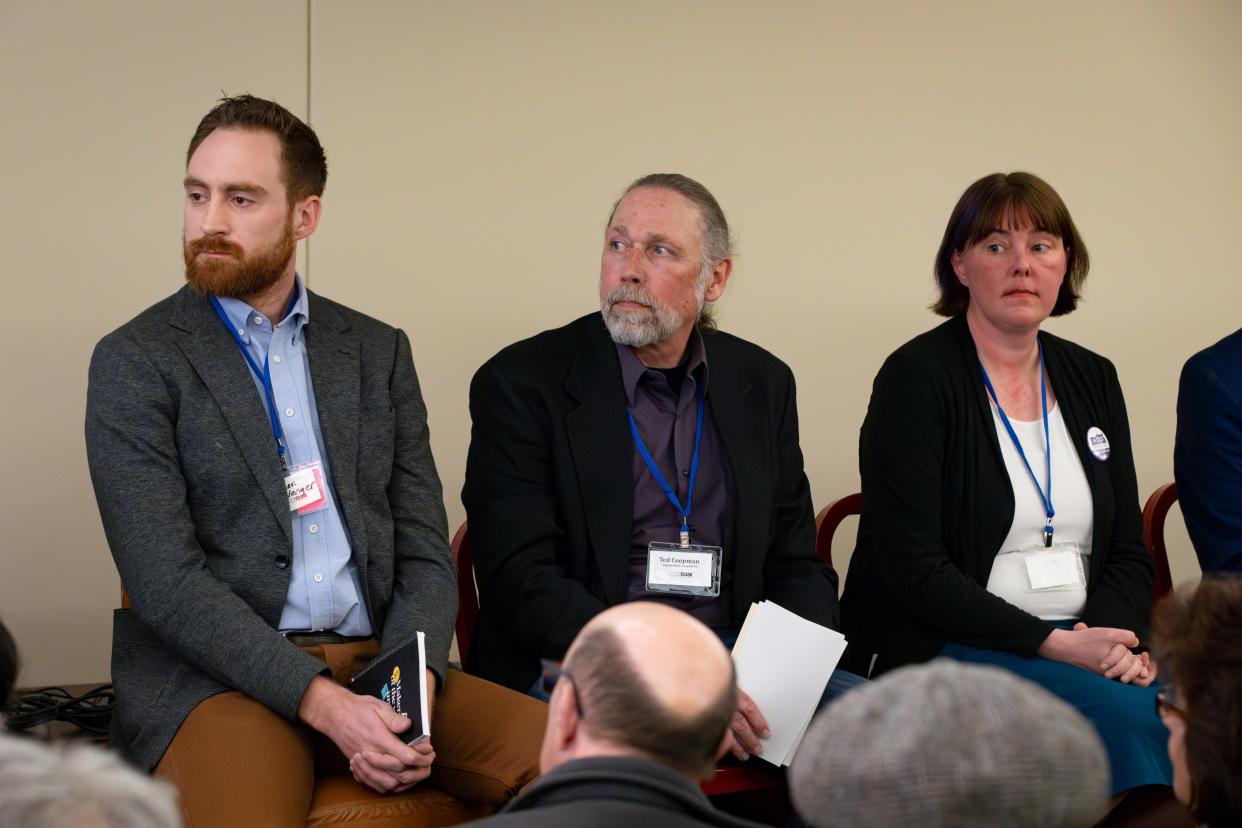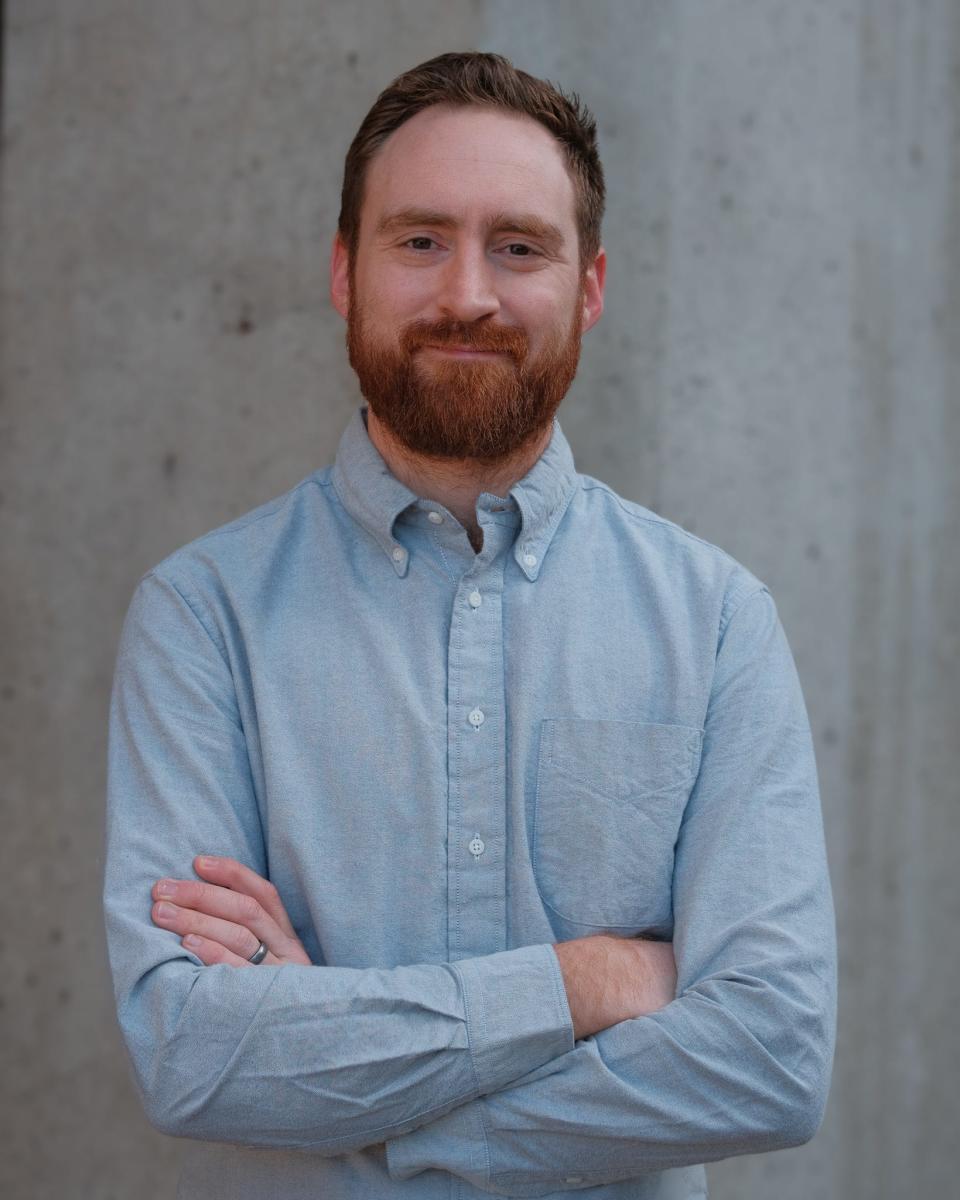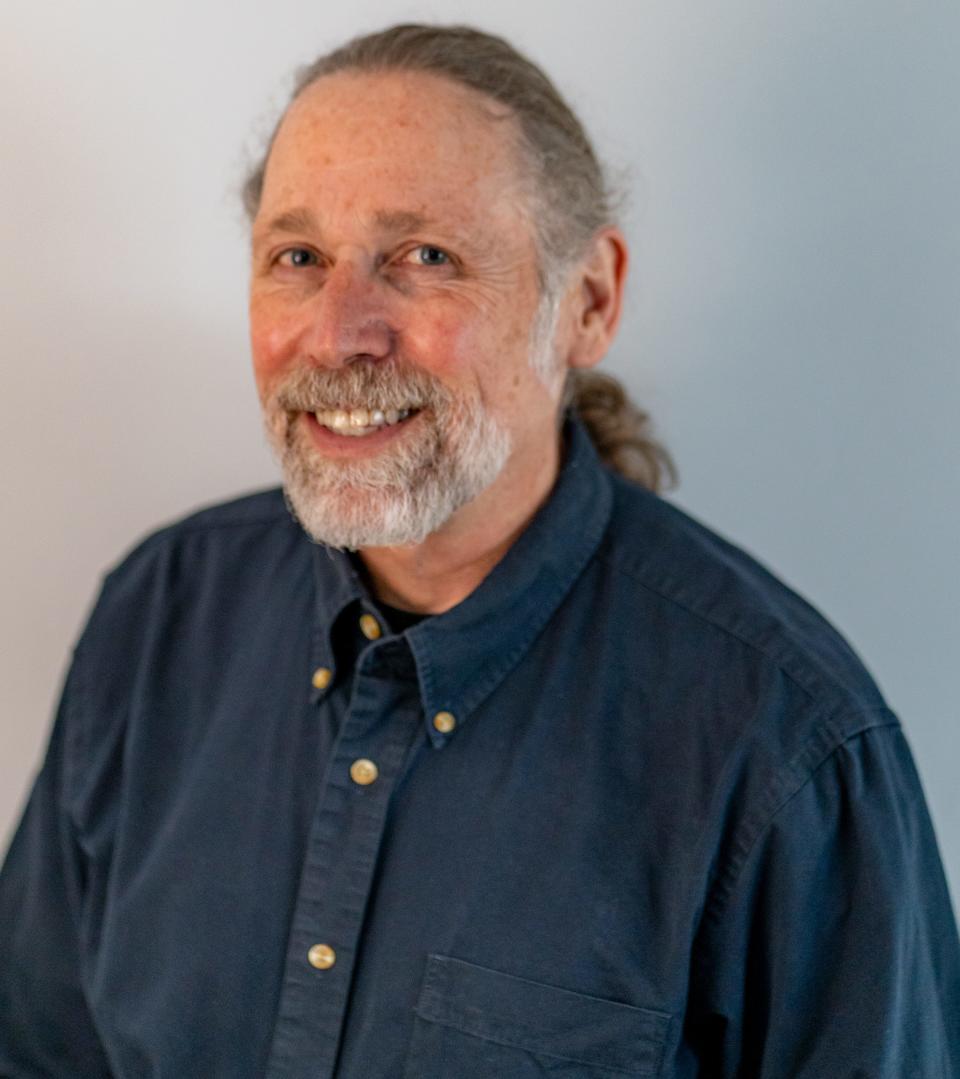Election 2024: Eugene City Council candidate Q&A with Clevenger, Coopman, Kashinsky

Corrections and Clarifications: An earlier version of this story mistakenly placed one of Ted Coopman's answers beneath the wrong question. The story was updated at 8:05 a.m. on Wednesday.
This is part of a series of stories on the candidates running in the May 21 primary election, with question-and-answer articles scheduled to be published each day through the rest of April. Ballots must be mailed to voters by May 1.
The elections for Eugene City Council are fast approaching, with ballots due May 21. Incumbent city councilor Emily Semple is retiring and three candidates have registered to run for the seat representing Ward 1 on Eugene City Council — Ethan Clevenger, Ted Coopman and Eliza Kashinsky.
City Council Ward 1 represents the center of Eugene and approximately covers the area south of 7th Avenue, east of City View Street, north of 28th Avenue, and west of High and Willamette Streets. If one of the three candidates earns a majority of votes in May’s primary election, they will run uncontested in the November general election. If no candidate earns a majority, the top two candidates will run head-to-head in November.
The Register-Guard asked each of the candidates a series of questions and asked them for biographical information. Here are Clevenger, Coopman and Kashinsky's answers, word-for-word. Candidates are listed alphabetically.
Biographical Information
Ethan Clevenger

Ethan Clevenger is a small business owner in downtown Eugene, and he and his wife live in Jefferson Westside. In 2018, he was part of the steering committee that reactivated the Active Bethel Community neighborhood association, and he then co-chaired that organization and served on its board. He is now the president of Downtown Eugene Merchants and a member of the Local Government Affairs Council at the Eugene Chamber.As city councilor for Ward 1, he said he intends to be decisive and focused in his work for more abundant and affordable housing, a welcoming and thriving downtown and public spaces, and economic mobility for everyone who chooses to build a life in Eugene.
Ted Coopman

Ted Coopman moved to Eugene in February 2016 and joined the Jefferson Westside Neighbors Board that April. Since 2018, he has served as chair, working with the city and county on a wide variety of initiatives including creating 80 units of affordable housing. As the Friends of Monroe Park lead for 8 years, he contributed several thousand volunteer hours. In 2021, Ted was the only neighborhood leader invited to join the Eugene Chamber of Commerce Business Leaders Task Force on Homelessness.
Ted is a first-generation college student, earning a bachelor’s in theater, a master’s in mass communications, and a doctorate in communication. He taught at San José State University for 13 years. Ted served on the Executive Boards of the American Communication Association and the Association of Internet Researchers. He spent 15 years in the restaurant and catering industry along with stints as a house painter, tree crew member, small business owner, retail salesperson, and martial arts instructor. He’s been involved in media democracy activism for more than 30 years.
Eliza Kashinsky

Residence- Ward 1, Jefferson Westside
Occupation- Senior Human Resources Analyst, Lane County.
Prior Occupation- Human Resources Director, South Lane Mental Health; Operations Director, Organic Materials Review Institute.
Relevant service-related positions- Eugene Budget Committee (2017 to present), vice-chair (2021 to present); Lane County Planning Commission (2021 to present), chair (2022-2023); Eugene Active Transportation Committee (2014 to 2016)
Questions
The Register-Guard began all questions to Eugene City Council candidates with, "If elected to city council, what strategies or policies would you support to:"
Increase housing affordability and/or supply in Eugene?
Clevenger: Housing has to be addressed on two fronts. We have to increase supply, of all kinds, and work with developers to understand why there aren't already more projects underway. It's not just about adding incentives, but about being a city that walks our pro-housing talk from the top down. We also must improve our local economy, and the economic mobility and buying power of average Eugeneans. Local wages aren't keeping up with rising wages at the state and federal levels. We're becoming poorer, which directly impacts how much house someone can afford. The Eugene Realtors agree and endorsed me accordingly.
Coopman: We have huge tracts of land within the Urban Growth Boundary where we can build homes, but they lack supporting infrastructure. Developing that infrastructure should be our primary focus. To be affordable, we must build housing at scale, not one-off infill. Instead, we need hundreds of homes, which is how we created supply and affordability after World War II. Subsidized housing, either via vouchers or subsidized construction, is the best option for our lowest income neighbors. As a neighborhood leader, I worked with Homes for Good to create 80 units of affordable housing and an early learning center.
Kashinsky: Eugene’s housing shortage and the skyrocketing price of housing in Eugene stems in large part from years of not building enough homes of enough different types to meet the community need. I have been working for almost a decade to ensure that barriers to housing, particularly small-scale housing like accessory dwelling units, are removed from our zoning code. I would continue and expand upon that work on Council, in particular working to fix processes and fee structures that prevent Eugene from creating the type of homes our residents need at prices they can afford.
Reduce homelessness in Eugene?
Clevenger: Our homeless community is not a monolith, but most broadly, homelessness is a housing problem. It shouldn't come as a surprise that the most vulnerable among us - those suffering from mental illness and drug addiction - are the first to end up unhoused. Increasing our supply of housing of all kinds will make housing more stable for folks across our community. For those with co-occurring conditions, we have to be able to invest in the wrap-around services they depend on.
Coopman: While homeless is a complex problem, every problem is a series of smaller problems. The primary responsibility for sheltering unhoused people is with the county and state, but they have underperformed, leaving Eugene to fill the gaps. With limited resources we should focus on getting people into safe, sanitary, and sanctioned campsites. Unsafe and unsanctioned camping is devastating Ward 1 low-income neighborhoods, open spaces, and local businesses. Street camping costs taxpayers millions of dollars every year. As we increase sanctioned camping, we need to progressively restrict street camping. Living on the street should never be an option.
Kashinsky: Homelessness has many causes, including a lack of housing and difficulty in accessing mental health and substance use treatment resources. In addition to confronting those issues, we need to continue and expand our safe shelter programs; continue to provide funding, support, and incentives for affordable and supported housing development; and expand on programs that help unhoused residents connect with the right resources for their situation. We also need to focus effort on programs that keep people in the housing they already have, so that they don’t become unhoused.
Improve Eugene’s economic development?
Clevenger: We're a city without an economic development plan. We must formalize a plan if we're going to grow our local economy and attract employers that can drive our local wages up and better fit the local cost of living. Part of that plan will likely include better collaboration with the University to alleviate brain drain, and also nurturing the parts of our economy, like the arts, that make our community livable and give us a local identity. Finally, a welcoming and accessible downtown is important for a diverse business landscape that includes thriving "main street" businesses.
Coopman: Eugene is a challenging place to operate a business. Two basic steps we can take are to create single-point contacts for businesses to help them navigate city services and permitting and mandate action plans for construction around businesses. Right now, road work is endangering the survival of several small businesses in Ward 1. That was completely avoidable. We can attract larger businesses by providing the needed infrastructure. Like housing, we have acres of land that lacks the needed infrastructure. Finally, the city needs to closely consult with, and listen to, industries before passing ordinances to find economically-sound common ground.
Kashinsky: My top priorities include fixing our housing shortage, addressing our homelessness crisis, and putting Eugene on more stable financial footing. All of these priorities also support economic development in Eugene. In order to thrive, Eugene’s businesses need to be able to hire and retain skilled employees. The shortage of homes in Eugene creates a major challenge for businesses looking to recruit; I have had multiple potential employees turn down job offers solely because they didn’t think they would be able to find a home here. Addressing the shortage of housing is essential for Eugene’s businesses to be successful.
Increase access to mental health resources in Eugene?
Clevenger: Oregon is at the bottom of the country for mental health resources. Locally, we have county resources and non-profit partners to provide these services. One goal of growing our local economy is to turn around the impending $12 million+ shortfall in our city budget and invest more heavily in our local providers. We must also ensure we're pressuring the county and state for better funding of mental health programs, given that those services aren't traditionally under the city's purview. Finally, in city offices, we have to lead with a YIMBY attitude if we're going to stand up more services.
Coopman: Lane County has the mandate, resources, and infrastructure to address mental health and addiction. Creating the city’s own parallel system is an expensive waste of time and money. We simple can’t afford it. Instead, we need to work more closely with and support Lane County Health and Human Services, as with its Crisis Stabilization Center. Partnering with the county is the biggest return on any investment. As a neighborhood leader, I worked with the county on placing its Medically Assisted Treatment clinic on W. 11th. Finally, we must vigorously lobby the state to increase the number of mental health beds.
Kashinsky: Increasing access to mental health resources in Eugene will require close collaboration with Lane County, as they are the designated Community Mental Health Program for the region. However, this does not alleviate the City’s responsibility to provide strong partnership to make sure our residents can get help if they need it. I would work closely with our partners at the County to advocate for increased State funding for mental health care, support programs for behavioral health workforce development such as apprenticeships, and expand upon collaborative efforts between jurisdictions.
Improve public safety in Eugene?
Clevenger: Welcoming and accessible public spaces are crucial to a livable city where people will choose to build a life. There must be an expectation that everyone in this city can use our parks, public spaces and downtown streets without fear. We have ordinances outlining unacceptable behavior in parks and downtown that we don't enforce at this time. We have to turn our budget around so that we can fund mental health, addiction, housing, and law enforcement services. We must also ensure our law enforcement system has a diverse response model to meet our diverse challenges appropriately.
Coopman: The Community Safety Payroll tax is starting to have an impact, but it is difficult to hire police for all jurisdictions. The use of Community Service Officers is an excellent way to take pressure off sworn officers and provide better service. I support the creation of a unified Lane County EMS system with its own funding to improve quality and mutual aid, taking the system out of regular budget battles across jurisdictions. Currently, the EMS system has no excess capacity, which is unacceptable. In addition, CAHOOTS must be professionalized with higher pay and better training.
Kashinsky: The majority of the funding for Eugene’s public safety infrastructure--including police services, fire services, judicial services, and human services—comes out of the general fund portion of the City’s budget, which currently has a large, ongoing shortfall. To improve public safety, we have to stabilize the funding for our safety infrastructure, so that we are not under the threat of having to cut a fire engine almost every budget. We also need to continue efforts to diversify our public safety services, so that we can ensure that the most appropriate and effective response is being sent to each situation
Alan Torres covers local government for the Register-Guard. He can be reached over email at atorres@registerguard.com or on X @alanfryetorres.
This article originally appeared on Register-Guard: Eugene elections: City Council candidates Clevenger, Coopman, Kashinsky

